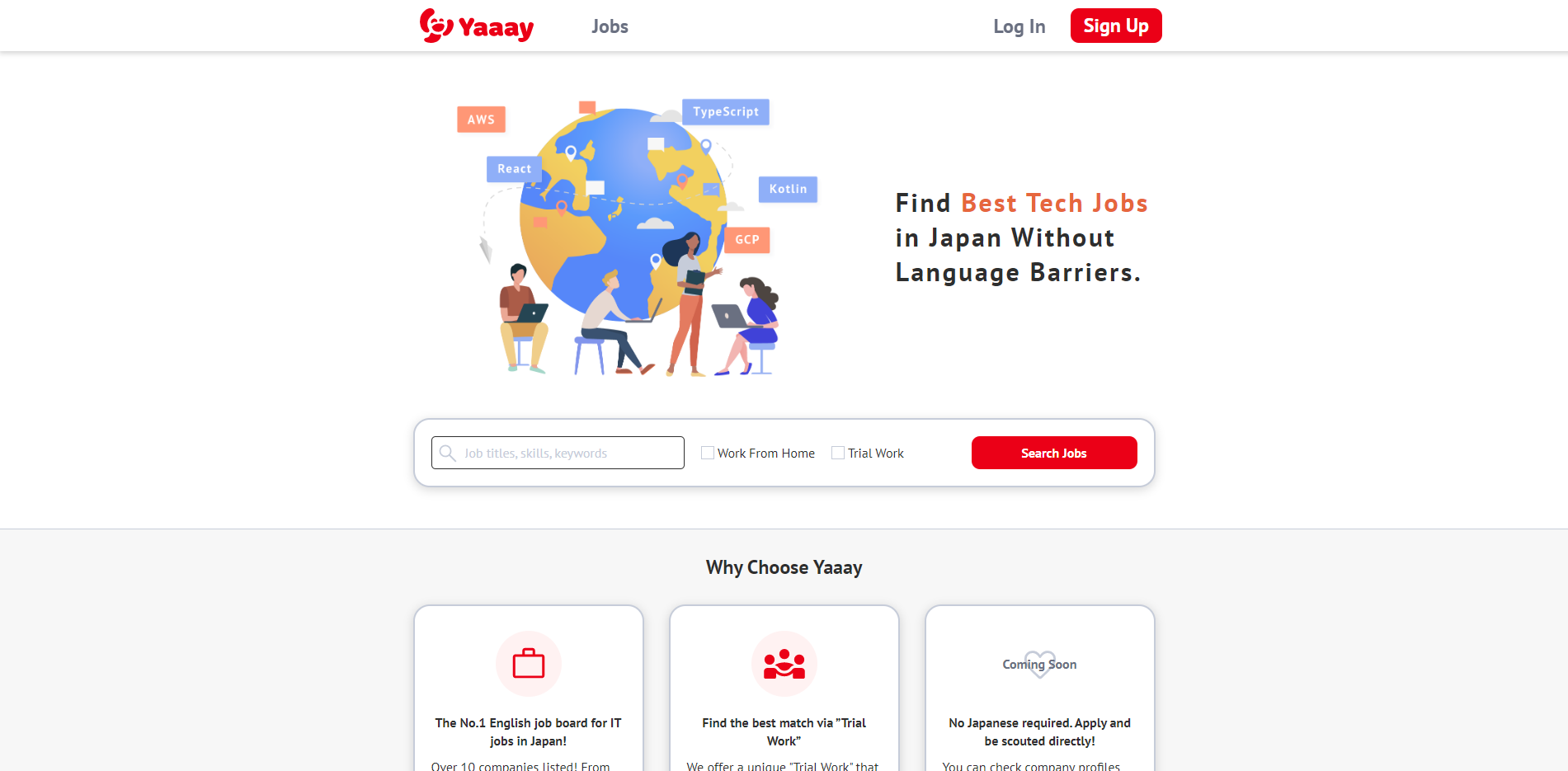How to get a Job in Japan from India

by Florian
Finding a job in Japan from abroad used to be hard – but things have changed. In this article, we introduce some ways how you can find work in Japan from India. For some of them, you won’t even have to leave your home!
コンテンツ
Japan’s Current Job Market Situation
Japan is currently facing the problems of a shrinking population. Families are having fewer and fewer children, and as a result, the number of young Japanese entering the workforce each year is decreasing. In a lot of industries, Japanese companies are having a hard time finding enough people to fill their open positions.
The lack of talent is especially noticeable in the tech and engineering sectors. Over 85% of IT companies in Japan feel either a strong or moderate lack of engineers. This sentiment is shared across the board – from companies with less than 30 employees to those with 1000 and more.
Currently, around 35% of IT companies in Japan are employing foreigners. The top three countries where those foreigners come from are China, South Korea, and Vietnam. India has not yet entered the Top 10.
However, the number of Indians in Japan is increasing. In June 2020, around 39,764 Indians were living in Japan, almost a 20% increase from 2018. Out of those Indian nationals, 9,621 were holders of the “Engineer/Specialist in Humanities/International Services” visa (+37% compared to 2018).
Jobs for Indians: IT Engineer
In Japan, engineers are needed across all job types – software engineering, system engineering, network engineering, web development, you name it. It would be no overstatement to say that if you have solid programming and development skills, IT is one of the easiest Japanese industries for foreigners to get into, probably only next to English teaching.
How about programming languages? The Japanese tech news outlet TECH Street found that the top three programming languages used by IT engineers in Japan were SQL, Java, and Javascript. According to data collected from multiple Japanese job change platforms, the languages with the most job ads are Java, Javascript, and PHP. In the last few years, Python has also been gaining traction. Being familiar with any of these languages should give you good chances on the job market.
READ ONFind out more about programming languages in Japan
Engineer Spotlight: Stefan
Stefan is a 23-year old engineer from Bengaluru. After entering university, he became interested in Japanese culture and started thinking about coming to Japan. At first, he was planning for a year abroad after university. Zenken Corporation was able to connect him with a Japanese company looking for young, talented engineers. To find out more, check out the video below!
Jobs for Indians: Other options
Of course, there is also demand for work outside of IT. A popular first job for foreigners first coming to Japan is English teaching, mainly because jobs are plentiful and there are schools that accept applications from abroad. The requirements differ from school to school, but if you speak English fluently and don’t have a strong accent, you should be able to find a position.
Foreigners in Japan can also find jobs in fields such as…
- – International Consulting/Training
- – Export/Import and Logistics
- – Headhunting
- – Translation and Interpreting
- – Tourism and Hospitality
You can find out more about the jobs above in this article. Note that compared to IT and English teaching, almost all of these require a significant amount of Japanese language skills. Intermediate to advanced business Japanese (equivalent to about JLPT N2) is widely considered to be the minimum.
How to find a Job in Japan from India
OK, so know you know about your options. But what do you do to find a job? Below, we’ve listed the three main approaches you can take. Some of them allow you to stay in India. For others, you will have to come to Japan. They all have their pros and cons, and you don’t have to pick one – so try out different approaches.
Option 1: Online Job Hunt
The internet offers a plethora of job board options. For work in Japan, the “big three” are Daijob, gaijinpot, and Jobs in Japan.
If you look a bit further, you’ll find even more: CareerCross, Robert Walters, Glassdoor, LinkedIn, etc. For IT engineers and developers, there are specialized sites like tokyodev and japan-dev.
There’s also Yaaay, a relatively new job board that offers a “trial work” option for the jobs advertised on its site. Through trial work, you can make sure that you’re happy with the company and your working environment before fully committing to the job.
Screenshot of Yaaay’s main page.
If you’re thinking about working in Japan, searching these sites is a good first step. You can do it from the comfort of your home, and finding open positions is a matter of seconds. You might even find one that suits you perfectly!
The drawback: The majority of jobs listed on these boards and websites require applicants to already live in Japan and have a valid working visa – one of the biggest hurdles for foreign job seekers. Also, especially the job adverts on the engineer-specialized sites tend to ask for quite a bit of experience. If you’re fresh out of university, getting such a job might be difficult.
Option 2: Short- to mid-term stay + job hunt
This option gets around the “needing a valid visa” part of many job requirements. The plan is to get a visa that allows you to stay in Japan for longer than a few weeks and search for jobs and do interviews while in the country.
If you want to go this route, you have a few different options:
- – University or Japanese Language School courses (Student Visa >>more info here)
- – Internship (Designated Activities Visa, among others >>more info here)
- – Private English Teacher or ALT work (Instructor OR Engineer/Specialist in Humanities Visa >>more info here)
It’s even possible to job-hunt on a tourist visa (short-term visa). That being said, unless you already have a few interviews lined up, 90 days might be a bit short for a successful job hunt. This is especially true if your Japanese level is low.
Option 3: Specialized Services
Many Japanese companies are recruiting students straight out of university. The main reason why companies in Japan are still hesitant to hire fresh graduates from abroad is that they are afraid of mismatches.
When hiring freshers, Japanese companies usually pay close attention to the applicant’s personality and character, even more so than their hard skills. Multiple rounds of face-to-face interviews are common practice – to make sure that the applicant is really a good fit for the company. Communicating across borders and language barriers makes this difficult.
However, attempts at bridging this gap are now being made. Zenken Corporation has launched a job placement service for engineers that enables Indian applicants to be hired by companies in Japan from India.
Here’s a quick rundown of the service’s main features:
- ✔ Sends you updates on open positions that match your skills, Japanese language level and other requirements
- ✔ Offers support such as advice on visa procedures
- ✔ Functions as a mediator between you and the company in Japan, preventing miscommunication
You start by creating a profile. For detailed instructions on how to do that, check this article. Otherwise, click the button below and jump right in!
Conclusion
Because of Japan’s current population decline predicament, finding a job as a foreigner is easier than ever, almost regardless of the industry. As long as you have a university degree and speak Japanese on a high level, you can succeed. If you don’t speak Japanese and feel that you won’t be able to catch up with the required language level in time, IT engineering and English teaching are the two main sectors to focus on.
Recommended Posts

The 10 Most Popular Japanese Companies in 2021
19 5月 2021 - Work



